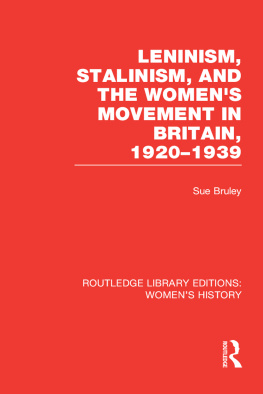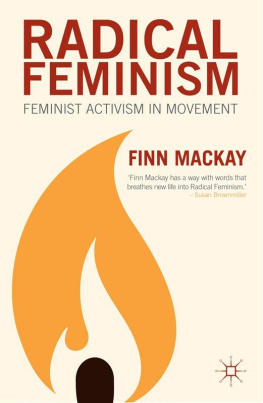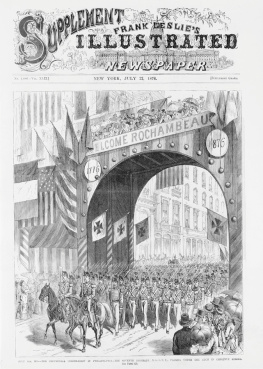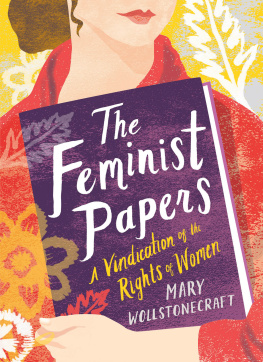Feminism as Lifes Work
Feminism as Lifes Work
Four Modern American Women through Two World Wars
Mary K. Trigg
RUTGERS UNIVERSITY PRESS
NEW BRUNSWICK, NEW JERSEY, AND LONDON
Library of Congress Cataloging-in-Publication Data
Trigg, Mary K., 1955
Feminism as lifes work : four modern American women through two world wars / Mary K. Trigg.
pages cm
Includes bibliographical references and index.
ISBN 9780813565231 (hardcover : alk. paper) ISBN 9780813565224 (pbk. : alk. paper) ISBN 9780813565385 (e-book)
1. FeministsUnited StatesBiography. 2. FeminismUnited StatesHistory20th century. I. Title.
HQ1412.T75 2014
305.420973dc23
2013033863
A British Cataloging-in-Publication record for this book is available from the British Library.
Portions of chapter 6 first appeared in Journal of Womens History 7, no. 2 (Summer 1995): 5285. Copyright 1995 The Johns Hopkins University Press.
Copyright 2014 by Mary K. Trigg
All rights reserved
No part of this book may be reproduced or utilized in any form or by any means, electronic or mechanical, or by any information storage and retrieval system, without written permission from the publisher. Please contact Rutgers University Press, 106 Somerset Street, New Brunswick, NJ 08901. The only exception to this prohibition is fair use as defined by U.S. copyright law.
Visit our website: http://rutgerspress.rutgers.edu
For my daughters, Laurel Trigg Rapp and
Sarah Kathleen Trigg Rapp, and in memory of my mother,
Margaret Katherine McLaughlin Trigg
Contents
This book and the four women in it have traveled with me for many years, and I have had the unique opportunity to consider the topics raised herelove, sex, marriage, motherhood, work, feminismfrom my own evolving vantage points over time. Since the very beginning of the idea for this book my husband, friend, and life partner Ronald Rapp has been a source of inspiration and fierce support. I could not have finished this without his kindness and loving encouragement. I am greatly in his debt.
I have also been richly blessed with intellectual mentors and cheerleaders who have played an invaluable role in shaping Feminism as Lifes Work and spurring me on to complete the book. Mari Jo Buhle introduced me to the field of womens history and advised me through early versions of this book with intelligence, friendship, and faith in its potential. Mary S. Hartman read the book early on and employed her sharp eye, large historical mind, and wide-ranging knowledge about marriage to offer wise suggestions. Nancy Hewitt has taught me a great deal about the history of US feminism, and about generosity. Her gracious willingness to read and comment upon numerous drafts and to steadfastly insist on the projects merit is humbling. I can only try to emulate these unstinting intellectual mentors and pioneer scholars; I am touched beyond words by their generosity.
Many have read this book in various stages, and I am grateful for the support and help of each one of them. I want to acknowledge Richard Meckel, Barton St. Armand, and the late William McLoughlin for their incisive comments and early confidence in the project. I thank Cynthia Gorman for her astute, close reading of the manuscript and her invaluable ideas for revision. I thank the anonymous readers for the time and care they took with the manuscript, and for their liberal sharing of their scholarly expertise. I thank Heather ONeill for her important reading and suggestions, and Adam Wilson for leading me to Heather at a critical moment. I am grateful to Rutgers University, especially the Institute for Womens Leadership and the Department of Womens and Gender Studies, for giving me an academic home and a source of inspiration. I thank the School of Arts and Sciences for the research leave that allowed me to work on this book.
I am grateful to the staff at the Schlesinger Library of Harvard University for their help in accessing the papers of the four women in this study, and the Woodrow Wilson Foundation for its endorsement. I extend my gratitude to Rutgers University Press and its fine staff, especially director Marlie Wasserman and my editor Katie Keeran. I appreciate more than I can say your patience and diligence in helping me to make this book as strong as it could be.
This has been a labor of love, and I have been buoyed up on this journey by the love of those most important to me, both living and dead. I thank my incredible daughters Laurel and Sarah, to whom this book is dedicated; my beloved mother Margaret Katherine McLaughlin Trigg, my father Warren Magruder Trigg Jr., my four sisters, my niece Kelly Kaems, and my loving husband. You are my force field and I have invoked you more than you know in the process of completing this book. I am eternally grateful.
AWA American Womans Association
CESL College Equal Suffrage League
CU Congressional Union
DS Tapes Doris Stevens Tapes, in DSP
DSP Doris Stevens Papers, 18841983; MC 546. Schlesinger Library, Radcliffe Institute, Harvard University, Cambridge, MA
ERA Equal Rights Amendment
IACW Inter American Commission of Women
IHGP Inez Haynes Gillmore Papers, 18721945; A25. Schlesinger Library, Radcliffe Institute, Harvard University, Cambridge, MA
II Correspondence Inez Irwin Correspondence (in NAWSA Papers)
IWW Industrial Workers of the World
LPC Lorine Pruette Clippings, in LPP
LPP Lorine Pruette Papers, 19151974; MC 306. Schlesinger Library, Radcliffe Institute, Harvard University, Cambridge, MA
LWV Papers League of Women Voters Papers, Library of Congress, Washington, DC
MB Papers Eli F. Ritter and Mary Beard Papers, DePauw University Archives, Greencastle, IN
MBPSL Mary Ritter Beard Papers, 19351958, A-9. Schlesinger Library, Radcliffe Institute, Harvard University, Cambridge, MA
NAWSA Papers National American Woman Suffrage Association Papers, Library of Congress, Washington, DC
NCNW National Council of Negro Women
NWP Papers National Womans Party Papers
SL Schlesinger Library, Radcliffe Institute, Harvard University, Cambridge, MA
SSC Sophia Smith Collection, Smith College, Northampton, MA
WCWA Papers World Center for Womens Archives papers, Schwimmer/Lloyd Collection, Ms. Division, New York Public Library Archives
WJCC Papers Womens Joint Congressional Committee Papers, Library of Congress, Washington, DC
Wood Papers C.E.S. Wood Papers, Huntington Library, San Marino, CA
WTUL Womens Trade Union League
WRC Womens Rights Collection, Schlesinger Library, Radcliffe College, Cambridge, MA
WTUL Womens Trade Union League
Middle-class, highly educated, and white, the quartet of women profiled in this book are an elite group, but they offer insights into the transformations taking place in the lives of middle-class American women in the 1910s, 1920s, and 1930s. The postWorld War I disillusionment, revolution in manners and morals, and changing understanding of love, sex, and commitment are all evidence of the profoundly altered world in which these four American feminists found themselves. Still, they experienced and interpreted the vicissitudes wrought by modern culture in different ways. A writer, a historian, an activist, and a psychologist, they devoted their careers to womens causes while struggling to compose their own lives in a rapidly changing society.








